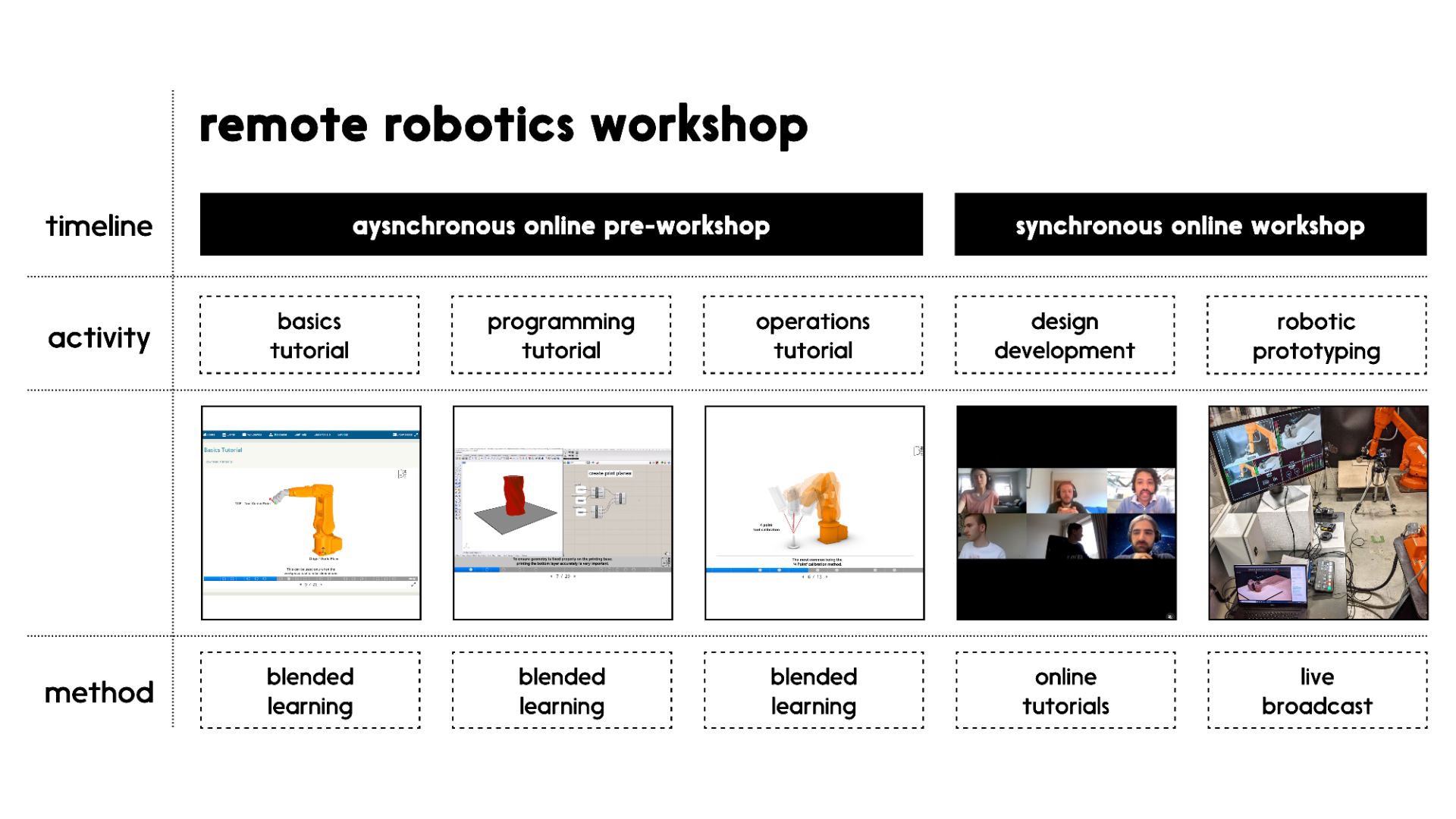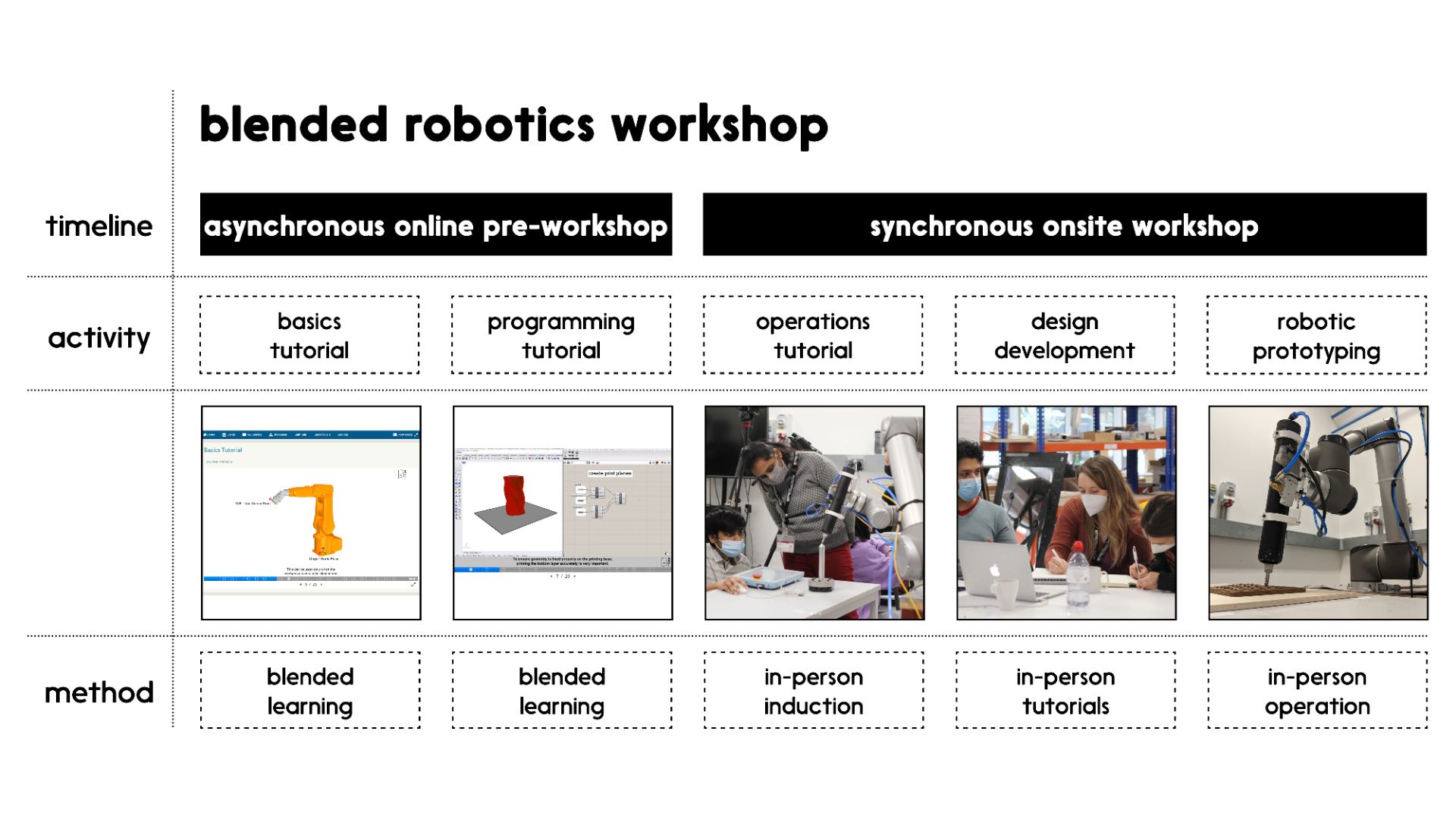Author: Pradeep Devadass
Co-Authors: Viktoria Viktorija, Ben Spong, Sam Turner-Baldwin, Guillem Perutxet Olesti, Jingyuan Meng
Abstract
Lab and Practice based education and research across the Higher Education Sector were particularly hit with the challenges of how to adapt to online methods of delivering teaching. Alongside the provisional measures of online delivery, came innovation in the areas of pre-session, asynchronous materials. The return to campus and the opportunity it affords to ‘return to normal’ prompts questions about what the new baselines of teaching are and could be and thus requires contemplation on what practices should be integrated as better practice. The Bartlett Manufacturing and Design Exchange (B-made) labs and workshops embraced the teaching of robotics as a testing ground for new teaching methodologies and have teased out potential solutions for activity-specific adaptations to the ever-evolving ‘new norm’ in teaching. As such, this presentation asks, how has B-made’s adaptation to a Blended curriculum in teaching robotics for architecture and construction accommodated new modes of learning and teaching?
The presentation will introduce the teaching, learning and feedback methods developed for the ‘B-made Robots’ course which teaches applied robotics to students. The pathway combines blended methods developed during the pandemic with traditional pre-pandemic on-site teaching methods. The teaching, learning and feedback methods are explained and analysed through 2 workshops: A ‘Remote Robotics Workshop’ conducted in the Spring term of 2021 and a ‘Blended Robotics Workshop’ conducted in the winter term of 2022. The presentation will also demonstrate how the course has impacted students and future possibilities for teaching in lab and practice-based programmes.
Introduction
B-made provides a manufacturing-based education in a design fuelled context to the students of BSA (Bartlett School of Architecture). B-made is a popular resource for students providing practical, contextual, and manufacturing-based education that enables the use of specialist equipment and processes. Students develop skills and projects that increase their employability as well as contribute to their design projects, both pedagogically and physically. Historically, B-made relies on face-to-face interactions for most activities such as answering questions, consultations, training, inductions, supervision, etc. Even outside of the context of Covid, this organic approach of supporting students 1:1 is no longer sustainable given that Bartlett has grown to a community of 2000 students and staff and B-made is a resource for the entire Bartlett community. The reduced building capacity and social distancing measures that were in effect throughout the past two years prompted a new approach to teaching and training. The Connected Learning, Blended by Design approach adopted, not only helps mitigate the reliance on face-to-face interactions but will also help democratise access to students who otherwise may lack the confidence or awareness to approach the workshop and ensures all students are able to access B-made resources and staff even without physically accessing the workshops. During the early stages of the pandemic, B-made were quick to adapt their teaching and communication methods to suit online learning. This fuelled the creation of a new applied robotics course focused on an architectural audience that adopted the emerging principles of blended and interactive teaching methods across UCL. Feedback from this course asked how we could increase student engagement and uptake of robotics in the BSA? And to what extent could this course compensate for the lack of physical access to the robotics labs during the pandemic? More information about the course and feedback are published in ‘Learning Robotics from home’ at the UCL Education Conference 2021.
Two workshops, ‘Remote Robotics Workshop’ & ‘Blended Robotics Workshop’ conducted in April 2021 & March 2022 respectively, were aimed at addressing these suggestions and feedback. The workshops were conducted in two distinct situations over a gap of almost a year. Social distancing restrictions were imposed in the former and lifted in the latter.
The focus of the workshops was to transfer the following knowledge:
- Basics: Learning the fundamentals of robotics and understanding the potentials and constraints of a specific robotic manufacturing process (3D Printing)
- Design: How to develop a design based on the manufacturing process constraints
- Programming: How to generate a robotic program
- Operations: How to operate a robot and manufacture a physical prototype
Remote Robotics Workshop
The workshop was conducted over 3 days and had 10 students from various programmes across the school. Face-to-face teaching was not recommended at the time, so synchronous and asynchronous content was supported remotely.
Basics tutorials were provided to the students through asynchronous, interactive content on Moodle a week prior to the workshop. This enabled students to understand the fundamentals, develop their design based on the opportunities and constraints and generate a robotic program before commencing the 3-day workshop. These tutorials were made up of videos that included animations, H5P interactive content and feedback through quizzes to embed the knowledge acquisition. The entire pathway was outlined and hosted through the B-made Moodle page and care was taken to include voiceovers and closed captioning.
During the synchronous workshop, tutorial conversations occurred online with students at home and tutors in the robot lab live streaming the robot through a 2-camera set-up. Designs were developed through building physical prototypes that were visually demonstrated to the students via the live stream. One camera was positioned to encapsulate the entire robotic setup to provide a sense of scale to the operation and the other allowed for more close-up understandings to be shown.

Review
The workshop was funded by UCL Changemakers. The workshop was reviewed by two student reviewers funded by the UCL Student Reviewers for Teaching. The student reviewers conducted a focus group and the workshop received positive ratings which was published in Changemakers Case Study. The workshop allowed the students to engage with the manufacturing process of their design in real-time through broadcasting which otherwise wouldn’t have been possible due to the restrictions. Although heavily assisted by the live stream and tutorial conversations, opportunities for the tactile, tacit and sensory modes of developing an understanding were inevitably limited. This equally limited the capacity for students to iterate their designs which in turn led to a more linear design development than typical without much reflection on materiality or manufacturing constraints.
Blended Robotics Workshop
The second workshop being presented was conducted over 5 days with 26 students from the Bio-Integrated Design (Bio-ID) master’s programme. The workshop was integrated within the programme’s curriculum to develop additive manufacturing knowledge which could enable students in their future research activities. The workshop focused on the development of advanced (non-planar strategies) 3d printing of a custom material developed within the Bio-ID lab. As a precursor to the workshop, a computational design tutorial was held a week prior which introduced Rhinoceros and Grasshopper software. Similar to the remote robotics workshop basics tutorials were provided to the students through asynchronous, interactive content on Moodle one week prior to the workshop. Unlike the previous workshop, these students were requested to develop a schematic design. During the 5-days, the workshop space was split into 3 labs: Design Lab, Materials Lab and Robotics Lab. On the first two days, lectures along with material and robotics lab in-person induction were conducted. In the material lab induction, the students learnt to customize the material to adapt to the 3d printing process. In the robotics lab induction, the operations tutorial which demonstrates how to control the robot was conducted using interactive tutorials. The interactive tutorial is a step-by-step instructional video that includes safety procedures, technical information and a sequence of commands for operations. Based on the knowledge received from inductions, the designs were developed in the design lab. Tutor-student feedback sessions were also conducted in the design lab. Multiple iterations of the design were manufactured, and each prototype was revised based on the learnings from the preceding. The workshop was simultaneously broadcasted providing an option to students who were not able to attend in person.

Review
The workshop received very positive feedback which was collected through an online questionnaire on Moodle. The compartmentalization of the workshop into the Design, Materials and Robotics lab led to a significant understanding of each process through an iterative approach to informing each other in parallel while in development. The interactive tutorials allowed us to easily scale up the in-person induction with minimal staff support and supervision. In the feedback, the students appreciated pre-learning prior to the workshop on Moodle, tutor-student discussion through process tutorials, in-person hands-on material and robotics induction enriched the overall learning experience. Although blended learning allowed the students to learn independently at their own pace, one of the main challenges in the past was in comparison to conventional classroom teaching, the course did not offer the possibility of dialogue when questions arise. The tutor-student process tutorial in the design lab allowed the students to clarify and discuss if any questions arose from the blended pre-learning on Moodle prior to the workshop. This blended learning reduced the repetitive teaching and allowed more time for tutor-student project-specific discussions. The students recognized that the workshop proved to be an excellent platform for them to exchange ideas and offered opportunities for collaboration.
Conclusion
The requirement for a combination of online and onsite teaching has never been more relevant. The experience, and feedback collected from these two workshops and various engagements have been valuable in informing future designs for teaching pathways not just in Robotics but in B-made and have great potential to be taken beyond our department. Teaching advanced and complex technical skills and concepts within an architectural environment over the last 2 years has provoked a critical review of conventional means of teaching these technologies and inspired creativity and innovation in offering improved offerings to students and to the lecturers supporting the teaching in these areas. Moving forward it is necessary to understand the expectations of each programme and develop a specific workshop tailor-made to transfer knowledge that is embedded in the context of their course. Once enough knowledge and experience are obtained, an abstraction to the common content needs to be incorporated into generic skills module in architecture education for robotic users.
Learning Pedagogy is to support four key goals summarised with the acronym MADE:
- M: Mitigate
- A: Adapt & Accommodate
- D: Demonstrate
- E: Enhance
Mitigate:
Minimise the need for face-to-face interactions and onsite access in cases that face to face is not necessary to make sure the workshop can maintain access for those users who most benefit from access to the onsite resources. (Due to safety issues such as maximum users at one time).
Adapt & Accommodate:
Be adaptable to the rapidly evolving circumstances, but always seek to democratise access and improve inclusivity.
Demonstrate:
Share technical experience and instructions for making, regardless of whether it will be in or outside of the B-made Workshop.
Enhance:
Invest in academic offerings that do not necessarily require any physical outputs and support activities such as research or sustainability considerations.
Credits:
Remote Robotics Workshop Tutors: Ben Lee, Georgios Drakontaeidis, Sienna Griffin-Shaw
Blended Robotics Workshop Tutors: Anete Krista Salmane, Guillem Perutxet Olesti, Jingyuan Meng, Sam Turner-Baldwin
Managers: Mark Burrows, Martyn Carter, Niamh Grace, Viktoria Viktorija
Director: Peter Scully